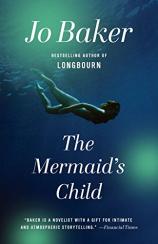The Mermaid's Child
Review
The Mermaid's Child
I haven’t used the word picaresque since college, when I answered an essay question about TOM JONES. But now, with Jo Baker’s THE MERMAID’S CHILD, it is relevant again, for this book (a paperback reissue of a 2004 novel) undoubtedly has the key elements of the genre: a roguish protagonist, often of the lower classes, telling his (or her) adventures in autobiographical form.
Baker likes to subvert and tinker with literary traditions. LONGBOURN (2013) refashioned the story of PRIDE AND PREJUDICE from the servants’ point of view, focusing on a housemaid, Sarah. The contrast between her bleak life of unremitting labor and the elegant, if fraught, existence of Miss Elizabeth Bennet could not have been more powerful.
This book does not offer the pleasure of a familiar story turned upside down, but Malin Reed’s odyssey did remind me, at various points in the narrative, of writers from Shakespeare to Fielding, Dickens to Mark Twain, with touches of Melville (a good half of the book takes place at sea) and Tolkien (like Bilbo and Frodo, she goes on a sort of quest).
Malin, born of the union between a ferryman and a mermaid (according to her father), grows up a feisty misfit in what seems to be a northern English village during an unspecified historical past. (She is telling her life story to an anonymous “you” whose identity is not revealed until the very end.) Water seems her natural element: “The sea, where my father had travelled, where my mother might still be found. Thick crashing waves, a bite in the air, and the ever-present dark enticement of the mermaids’ song. My people.” So when an opportunity presents itself in the shape of Joe --- an attractive stranger who saves the town from drought by apparently making rain --- she leaves with him, hoping to find her mother.
Joe is a con artist: He goes from village to village sniffing out trouble, produces “cures” in little blue bottles, then absconds in the middle of the night. When they reach the sea at last, an unsavory place called Sailtown, he gambles away his money, pimps Malin out, and finally in effect sells her, making her his stake in a losing game of dice. That’s when she runs for the second time.
"THE MERMAID’S CHILD reads almost like a gorgeous epic poem, stuffed with fresh, imaginative prose that I’d like to hear read out loud.... Jo Baker possesses a voice and gift for language that are like no one else’s."
Masquerading as a boy, she signs on as crew with the slave ship Sally Ann. The captain is a twisted sadist (shades of Claggart in BILLY BUDD), but she finds a protector --- and, eventually, a lover --- in John Doyle, who teaches her to walk the rigging and topsails “like they were country paths.” When the slaves are taken on, however, shipboard life becomes tragic; every day, more of them die. Malin hallucinates that she sees and hears mermaids, and in her frenzy she strikes the captain. A terrible lashing follows, yet she not only survives but takes revenge, freeing the slaves and making her own escape.
She is picked up by another ship, the Spendlove, an odd, Dickensian creation whose only cargo is books and whose only passenger is an ancient scholar named Jebb (even the name sounds like an escapee from OLIVER TWIST). Malin educates herself, reading all night, and claims to have found “evidence” that mermaids exist, in a white sea. Jebb scoffs: He loves books but says she can’t trust them: “[T]hey contradict each other, they obfuscate, they lie. Books are crooks.” (Ironic, given Baker’s own blend of fact and fancy.)
But just as the Spendlove reaches the fabled white sea, pirates attack. Jebb is killed and Malin captured and sold for a slave in some unidentified desert country. Her purchaser, though, has a sidekick, a naive and sympathetic young man. She seduces him (the forced whoring has made her blasé about sex) and flees into the sandy wasteland. Almost dead from thirst, she’s rescued by a passing circus: the very same outfit that came to her village when she was a little girl, among its oddities a caged mermaid. Although the circus no longer has a mermaid (“They never last long,” says Marguerite, the former Fat Lady), they could use a tightrope walker (Malin learns fast; her sailoring skills serve her well). And then --- well, I think my synopsis should stop lest I give away the denouement (or run out of space). Suffice it to say that she comes full circle, ending up back in the village.
THE MERMAID’S CHILD reads almost like a gorgeous epic poem, stuffed with fresh, imaginative prose that I’d like to hear read out loud. It is not exactly a realistic book; while filled with meticulously described settings, it also abounds in quasi-magical events and coincidences literally too good to be true. As in LONGBOURN, harsh facts (servants’ lives in early 19th-century England; the fate of slaves) are juxtaposed with elements of fantasy and romance. Both Sarah and Malin have true loves, though Malin’s is perhaps not what you might expect.
But any novel that takes the protagonist through one life-threatening adventure after another is by definition plot driven rather than organically structured. In LONGBOURN, I felt that the action flowed from the development of Sarah’s character, and the result is gripping; the events of this book, in contrast, seem almost random. Malin starts out as a rebel with few scruples; Baker gives her a conscience and then, toward the end, engineers a vast personal transformation. Neither, to me, was quite believable. Malin is more credible as an unrepentant rascal, and I think that in the course of her journey she acquires survival skills rather than a deep moral sense. THE MERMAID’S CHILD works better as an adventure tale than as an emotionally engaging story.
Yet it is a seductive novel. Although it (intentionally) echoes a number of literary classics, it is by no means derivative. Jo Baker possesses a voice and gift for language that are like no one else’s. Let us say that THE MERMAID’S CHILD has both the comfort of a literary tradition that lets us know in advance that the heroine will live to tell the tale, and the almost unbearable thrill of her exploits. It’s like watching or reading a scary tale from the safety of one’s own living room. What could be more delicious?
Reviewed by Kathy Weissman on March 26, 2015
The Mermaid's Child
- Publication Date: March 17, 2015
- Genres: Fantasy, Fiction, Historical Fantasy, Historical Fiction
- Paperback: 288 pages
- Publisher: Vintage
- ISBN-10: 0804172633
- ISBN-13: 9780804172639





